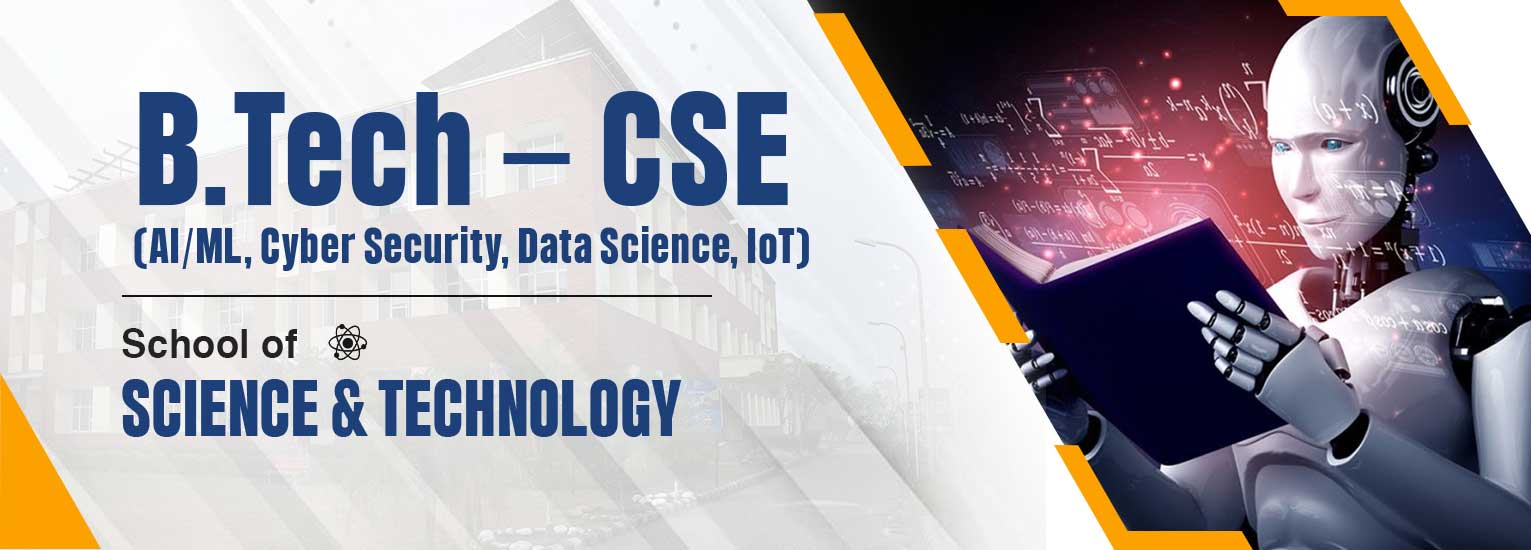B.Tech – CSE (AI/ML, Cyber Security, Data Science, IoT)
Course Overview
B.Tech in Computer Science Engineering (CSE) with Specializations in AI/ML, Cybersecurity, Data Science, and IoT – Premier B.Tech CSE Institution in Dehradun.
Are you seeking a top-tier B.Tech CSE college in Dehradun, Uttarakhand, or across India to embark on a career in Artificial Intelligence (AI) and Machine Learning (ML)? Our B.Tech program in Computer Science Engineering (CSE) with a specialization in AI & ML is an exceptional undergraduate course designed to equip students with advanced skills in machine learning, artificial intelligence, and intelligent systems.
This curriculum provides a solid foundation in programming languages, algorithms, data structures, and computer architecture, while emphasizing the practical applications of AI and ML. Graduates will gain proficiency in deep learning, neural networks, and automation, preparing them to become industry-ready professionals in the rapidly evolving technology sector.
B.Tech CSE with a Specialization in Cybersecurity
Our B.Tech CSE program with a specialization in Cybersecurity is among the most popular choices for students aspiring to build careers in ethical hacking, information security, and cyber defense. Recognized as one of the leading B.Tech CSE colleges in Uttarakhand and India, we offer comprehensive hands-on training in cybersecurity, risk management, and cryptography.
This four-year undergraduate program integrates computer science, software engineering, and cybersecurity principles to prepare students for careers in government agencies, financial institutions, healthcare, and the IT sector. Given the rising prevalence of cyber threats, there is a significant demand for cybersecurity professionals, and this program ensures that students are thoroughly equipped for success in the field.
B.Tech in Computer Science Engineering with a Specialization in Data Science
Our B.Tech program in Computer Science Engineering, specializing in Data Science, is tailored for students who are enthusiastic about big data, predictive analytics, and artificial intelligence. As one of the premier institutions for B.Tech CSE in Dehradun and across India, we are committed to equipping students with the skills necessary for data-driven decision-making, machine learning, and data visualization.
The program's curriculum merges computer science principles with AI and big data analytics, offering students hands-on experience with real-world data challenges. Graduates will have the opportunity to pursue careers in various sectors, including finance, healthcare, e-commerce, government, and technology, where there is a significant demand for data science professionals.
Reasons to Choose Our Program:
-
Acknowledged as one of the leading B.Tech CSE colleges in Dehradun, Uttarakhand, and India.
-
A curriculum aligned with industry standards, featuring practical projects and experiential learning.
-
Highly qualified faculty with substantial expertise in AI, machine learning, cybersecurity, and data science.
-
Advanced laboratories and research facilities designed to enrich the educational experience.
-
Robust industry partnerships facilitating internships and job opportunities.
If you are seeking a distinguished B.Tech CSE college in Dehradun that offers specializations in AI & ML, Cybersecurity, and Data Science, this is the ideal institution to kickstart your career in Computer Science Engineering.
Apply now to become a tech professional prepared for the future! Click here
Eligibility Criteria
B.Tech CSE with specialization in Artificial Intelligence & Machine Learning
Eligibility: All interested candidates should have passed Class XII from a recognized board of examination with Physics, Mathematics and Chemistry or equivalent or as per AICTE guidelines with not less than 50% marks either in PCM or aggregate.
B.Tech CSE with specialization in Cybersecurity
Eligibility: All interested candidates should have passed Class XII from a recognized board of examination with Physics, Mathematics and Chemistry or equivalent or as per AICTE guidelines with not less than 50% marks either in PCM or aggregate.
B.Tech CSE with specialization in Data Science
Eligibility: All interested candidates should have passed Class XII from a recognized board of examination with Physics, Mathematics and Chemistry or equivalent or as per AICTE guidelines with not less than 50% marks either in PCM or aggregate.
Career Opportunities
B.Tech CSE with specialization in Artificial Intelligence & Machine Learning
Career Prospects: The program prepares students to work in diverse industries such as healthcare, finance, retail, automotive, and more. Graduates can choose to work in various companies, from start-ups to large multinational corporations. In addition, this program provides a solid foundation for students who wish to further their education in the field of machine learning and AI.
Choose to be:
- Machine learning engineers
- Data scientists
- AI specialists
- Research scientists
- Business intelligence developers
B.Tech CSE with specialization in Cybersecurity
Career Prospects: Cybersecurity offers a wide range of career opportunities, including security analysts who monitor and analyze security threats, security consultants who help clients develop security strategies, penetration testers who test computer systems for vulnerabilities, security engineers who design and implement security solutions, cryptographers who encrypt and decrypt data, cybersecurity managers who oversee the security of an organization’s computer systems and networks, forensic analysts who investigate security breaches, ethical hackers who work with government agencies, and chief information security officers who are responsible for an organization’s overall security strategy. With the increasing importance of digital security, there is a growing demand for skilled professionals in this field.
B.Tech CSE with specialization in Data Science
Career Prospects: Professionals in artificial intelligence and data science are in high demand, with job roles including data analysts, data scientists, machine learning engineers, artificial intelligence researchers, statistical programming analysts, and business intelligence analysts. These professionals are responsible for analyzing copious amounts of data, building predictive models, and developing intelligent algorithms that can automate processes and improve decision-making. Artificial intelligence and data science have also transformed education by providing new tools and techniques for analyzing student data and improving student outcomes. As businesses increasingly rely on data-driven insights, the demand for artificial intelligence and data science professionals is expected to continue to grow, making it a promising career path for those with strong analytical and technical skills.
